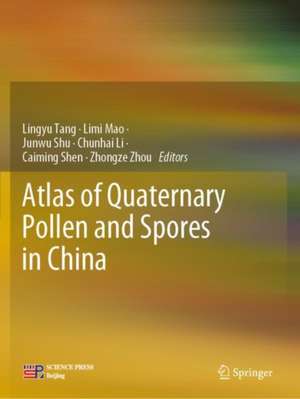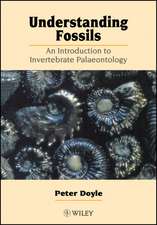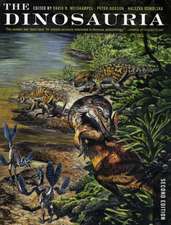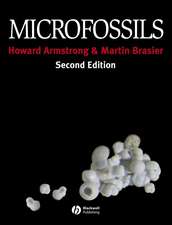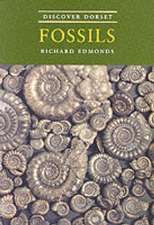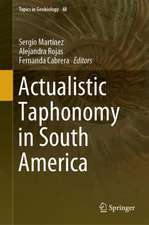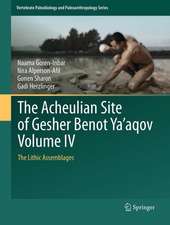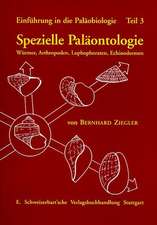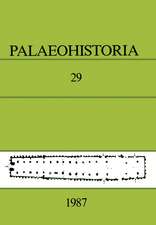Atlas of Quaternary Pollen and Spores in China
Editat de Lingyu Tang, Limi Mao, Junwu Shu, Chunhai Li, Caiming Shen, Zhongze Zhouen Limba Engleză Paperback – 27 aug 2021
| Toate formatele și edițiile | Preț | Express |
|---|---|---|
| Paperback (1) | 1242.81 lei 6-8 săpt. | |
| Springer Nature Singapore – 27 aug 2021 | 1242.81 lei 6-8 săpt. | |
| Hardback (1) | 1105.51 lei 38-45 zile | |
| Springer Nature Singapore – 15 apr 2020 | 1105.51 lei 38-45 zile |
Preț: 1242.81 lei
Preț vechi: 1515.62 lei
-18% Nou
Puncte Express: 1864
Preț estimativ în valută:
237.85€ • 246.43$ • 198.50£
237.85€ • 246.43$ • 198.50£
Carte tipărită la comandă
Livrare economică 21 martie-04 aprilie
Preluare comenzi: 021 569.72.76
Specificații
ISBN-13: 9789811371059
ISBN-10: 9811371059
Pagini: 578
Ilustrații: XV, 578 p. 517 illus., 474 illus. in color.
Dimensiuni: 210 x 279 mm
Greutate: 1.32 kg
Ediția:1st ed. 2020
Editura: Springer Nature Singapore
Colecția Springer
Locul publicării:Singapore, Singapore
ISBN-10: 9811371059
Pagini: 578
Ilustrații: XV, 578 p. 517 illus., 474 illus. in color.
Dimensiuni: 210 x 279 mm
Greutate: 1.32 kg
Ediția:1st ed. 2020
Editura: Springer Nature Singapore
Colecția Springer
Locul publicării:Singapore, Singapore
Cuprins
Overview of modern and Quaternary vegetation in China.- Major types of Quaternary pollen and spores and their characteristics in different regions of China.- Plates and descriptions of Quaternary pollen and spores in different regions of China.
Notă biografică
Lingyu Tang is Professor at Nanjing Institute of Geology and Palaeontology, Chinese Academy of Sciences. His research field is Quaternary Palynology and he is interest in Palynology, Paleovegetation, Paleoclimate and Paleoenvilonmet.
Limi Mao is Professor at Nanjing Institute of Geology and Palaeontology, Chinese Academy of Sciences, His research field is Quaternary Palynology and he is interested in Pollen morphology, mangrove Palynology and vegetation history. Limi Mao received his Ph.D at Osaka City University on Holocene mangrove vegetation history on Hainan Island of China in 2004. Then he began his postdoctoral study on airborne pollen and distribution in Western China Xinjiang during 2005 and 2007 at Institute of Botany, Chinese Academy of Sciences (IBCAS). Since 2008, he has been based at Nanjing Institute of Geology and Palaeontology, Chinese Academy of Sciences (NIGPAS), and his study has been mainly focusingon mangrove history and palaeobiogeography, pollen morphology, particularly for mangrove pollen flora of China, and cultivated cereals associated with human agriculture. He received his full Professor at NIGPAS in 2017.
Junwu Shu is Associate Professor at Nanjing Institute of Geology and Palaeontology, Chinese Academy of Sciences (NIGPAS). His research filed is Quaternary Palynology and Archaeological Environment and he is interested in Pre-historical Rice Agriculture, Human impact, Vegetation History and Grassland. Junwu SHU finished his PhD at NIGPAS focusing on understanding early rice-cultivator’s role in Neolithic vegetation change and landscape dynamics in the center of early rice agriculture in the Yangtze River region, eastern China in 2007. Afterward, he got a JSPS postdoctoral scholarship in Japan to compare Quaternary vegetation history, fire regime and human-nature relationship between eastern China and western Japan. Later, he became an Associate Professor and put new insights that the traditional agriculture practice “Slash and Burn” is not suitable for rice farming in the low coastal plains, east China and grasslands in Aso Caldera area, central Kyushu, was maintained with fire by humans for the last 13ka.
Chunhai Li finished his PhD at NIGPAS focusing on “The changes of vegetation and climate during the Last Pleistocene in Jingning area, Gansu Provence, China” in 2003. He is now Associate Professor at Nanjing Institute of Geography and Liminnology, Chinese Academy of Sciences (NIGLAS). His research field is Quaternary Palynology and Archaeological Environment. He is interested in Archaeological Environment, Human impact, Vegetation History
Caiming Shen received his Ph.D in Physical Geography, Louisiana State University in 2003 and now he is Professor in physical geography. His research field is Quaternary paleoecology and paleoclimatology. He is interested in Palynology, Paleoecology, Paleoclimatology, Forest fires, Lake sediments and has leaded or participated in a series of projects funded by Chinese and US NSF, the Chinese National Council of Science & Technology and Chinese Academy of Sciences, US Department of Energy.
Zhongze Zhou received his Ph.D. in Quaternary Palynology, at Nanjing Institute of Geology & Paleontology in 1997.He is now Professor at Anhui University, China. His research field is Botany, flora, Pollen Morphology and he is interested in Pollen morphology and Plant Taxonomy.
Limi Mao is Professor at Nanjing Institute of Geology and Palaeontology, Chinese Academy of Sciences, His research field is Quaternary Palynology and he is interested in Pollen morphology, mangrove Palynology and vegetation history. Limi Mao received his Ph.D at Osaka City University on Holocene mangrove vegetation history on Hainan Island of China in 2004. Then he began his postdoctoral study on airborne pollen and distribution in Western China Xinjiang during 2005 and 2007 at Institute of Botany, Chinese Academy of Sciences (IBCAS). Since 2008, he has been based at Nanjing Institute of Geology and Palaeontology, Chinese Academy of Sciences (NIGPAS), and his study has been mainly focusingon mangrove history and palaeobiogeography, pollen morphology, particularly for mangrove pollen flora of China, and cultivated cereals associated with human agriculture. He received his full Professor at NIGPAS in 2017.
Junwu Shu is Associate Professor at Nanjing Institute of Geology and Palaeontology, Chinese Academy of Sciences (NIGPAS). His research filed is Quaternary Palynology and Archaeological Environment and he is interested in Pre-historical Rice Agriculture, Human impact, Vegetation History and Grassland. Junwu SHU finished his PhD at NIGPAS focusing on understanding early rice-cultivator’s role in Neolithic vegetation change and landscape dynamics in the center of early rice agriculture in the Yangtze River region, eastern China in 2007. Afterward, he got a JSPS postdoctoral scholarship in Japan to compare Quaternary vegetation history, fire regime and human-nature relationship between eastern China and western Japan. Later, he became an Associate Professor and put new insights that the traditional agriculture practice “Slash and Burn” is not suitable for rice farming in the low coastal plains, east China and grasslands in Aso Caldera area, central Kyushu, was maintained with fire by humans for the last 13ka.
Chunhai Li finished his PhD at NIGPAS focusing on “The changes of vegetation and climate during the Last Pleistocene in Jingning area, Gansu Provence, China” in 2003. He is now Associate Professor at Nanjing Institute of Geography and Liminnology, Chinese Academy of Sciences (NIGLAS). His research field is Quaternary Palynology and Archaeological Environment. He is interested in Archaeological Environment, Human impact, Vegetation History
Caiming Shen received his Ph.D in Physical Geography, Louisiana State University in 2003 and now he is Professor in physical geography. His research field is Quaternary paleoecology and paleoclimatology. He is interested in Palynology, Paleoecology, Paleoclimatology, Forest fires, Lake sediments and has leaded or participated in a series of projects funded by Chinese and US NSF, the Chinese National Council of Science & Technology and Chinese Academy of Sciences, US Department of Energy.
Zhongze Zhou received his Ph.D. in Quaternary Palynology, at Nanjing Institute of Geology & Paleontology in 1997.He is now Professor at Anhui University, China. His research field is Botany, flora, Pollen Morphology and he is interested in Pollen morphology and Plant Taxonomy.
Textul de pe ultima copertă
This book provides an important reference guide to pollen and spore identification for Chinese Quaternary palynological studies. Presenting and describing more than 400 color photomicrographs of pollen grains and spores retrieved from sediments in China, it offers a unique asset for researchers, graduate students, and newcomers to the field of Quaternary palynology, which constitutes a major aspect of Quaternary paleoecology, paleoclimatology, and paleogeography.
Caracteristici
Presents the first-ever overview of the morphology of fossil pollen and spores from Quaternary sediments Includes more than 400 top-level plates illustrating typical fossil pollen and spores Offers a comprehensive review of Quaternary pollen assemblages in various regions of China
